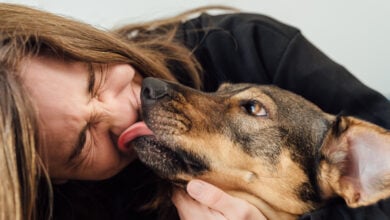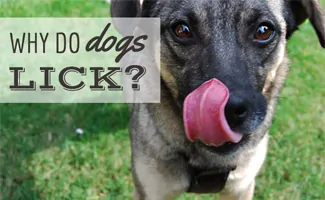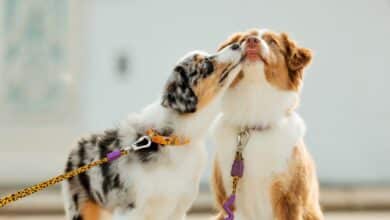Is Your Dog Secretly A Cow? Top 7 Reasons They Like To Graze
When you purchase through links on our site, we may earn a commission. Here’s how it works.
Have you ever caught your dog munching on grass like they’re some kind of backyard cow? You’re not alone. One minute, they’re sniffing around, and the next, they’re chomping down on blades of grass like it’s their favorite treat. It’s enough to make any pet owner stop and wonder: Why do dogs eat grass?
Table of Contents

Some say dogs do it because they’re sick, while others believe it’s a sign of a nutritional deficiency. Maybe you’ve even heard that dogs eat grass to make themselves vomit. But what if none of those explanations are completely true? The real reasons behind this odd behavior might surprise you!
Before you start worrying or rushing to stop your dog from grazing, let’s break it all down. Is eating grass normal? Should you be concerned? And most importantly, do you need to do anything about it? In this guide, I uncover the real reasons why dogs eat grass, separate fact from fiction, and help you decide if you need to take action.
Keep reading because, by the end of this, you’ll know exactly when to ignore it, when to intervene, and how to stop it if necessary!
Why Do Dogs Eat Grass?
So, you just caught your dog munching on grass like they’re trying out a new diet trend. First, you wonder, “Is my dog sick?” Then, you start questioning if you need to put an end to this behavior. Before you jump to conclusions, let’s break it down. Because the truth about why dogs eat grass is more interesting than you might think.
Is It Normal For Dogs To Eat Grass?
The short answer is yes. Grass-eating is common in dogs. In fact, research suggests that nearly 80 percent of dogs have been observed eating grass at some point. Some dogs do it occasionally, while others seem to make it part of their daily routine.
Many dog owners assume this behavior means their pup has an upset stomach and needs to vomit. While that can be true in some cases, it’s actually not the most common reason. Interestingly, studies show that most dogs eat grass without showing any signs of illness or throwing up afterward.
So, if your dog is casually nibbling on some fresh blades, there’s a good chance it’s just a normal part of their behavior. However, there are situations where grass-eating might signal an issue, and that’s what we need to look at next.
Should You Be Worried?
In most cases, a dog eating grass is not a cause for concern. It’s similar to how some people like chewing on ice or snacking on sunflower seeds, which is just a habit they enjoy. However, there are times when this behavior could indicate a problem, especially if you notice any of the following:
- Your dog is eating grass excessively as if they are trying to get something out of their system.
- They vomit frequently after eating grass rather than just on rare occasions.
- They show signs of discomfort, such as whining, pacing, drooling, or refusing to eat their regular food.
- They eat grass that has been treated with pesticides, herbicides, or fertilizers, which can be toxic.
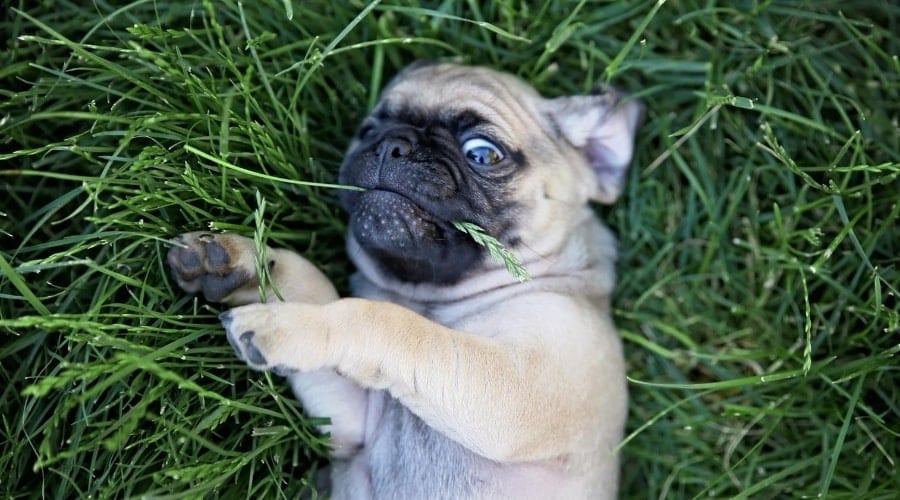
If any of these red flags apply to your dog, it’s important to figure out why they are eating grass and whether you need to intervene. Eating chemically treated grass is very dangerous for your pup, so stop them from eating it immediately. I cover the dangers of eating grass later on, so please stick around for this!
Myth vs. Reality: Is Grass-Eating Dangerous?
There are a lot of misconceptions about why dogs eat grass. Some theories have been passed around for years, but science tells a different story. Let’s separate fact from fiction.
Myth #1: Dogs Eat Grass Only When They Are Sick
Many people believe dogs use grass as a natural remedy to make themselves vomit when they have an upset stomach. While some dogs do throw up after eating grass, studies show that fewer than 25 percent actually vomit. Most dogs eat grass without showing any signs of illness, so this theory doesn’t explain the behavior of the majority of dogs.
Myth #2: Eating Grass Always Leads To Vomiting
It’s a common assumption that grass acts as an irritant to a dog’s stomach, making them throw up. In reality, most dogs don’t vomit after eating grass. If a dog does throw up, it may be due to the texture of the grass rather than an intentional effort to relieve nausea. And if they still aren’t feeling well, they could have an issue unrelated to eating grass. Read more tips to cure an upset stomach.
Myth #3: Grass-Eating Means A Dog Has A Nutritional Deficiency
Some people think dogs eat grass because they lack certain nutrients, like fiber or minerals, in their diet. While some dogs may crave extra roughage, most grass-eating dogs are already on well-balanced diets. Research hasn’t found a direct link between grass-eating and nutritional deficiencies, so this theory remains unproven.
Myth #4: All Grass Is Safe For Dogs To Eat
Not all grass is created equal. While fresh, untreated grass is generally safe, some lawns are treated with pesticides, herbicides, or fertilizers that can be harmful. Additionally, certain plants mixed in with the grass, such as foxtails, oleander, or certain mushrooms, can be toxic. This is why it’s important to be aware of what’s growing in your yard or anywhere your dog roams.
Dogs should never eat grass that has been treated with pesticides, herbicides, or fertilizers because these chemicals can be highly toxic. Even small amounts of exposure can cause vomiting, diarrhea, drooling, tremors, or even organ damage in severe cases. Many lawn treatments contain glyphosate, 2,4-D, and other harsh chemicals that linger on grass blades long after application. If a dog ingests these toxins, they can suffer from immediate poisoning or long-term health issues like liver or kidney damage.
To keep your dog safe, always check if a lawn has been chemically treated before letting them graze, and consider using pet-safe lawn fertilizer. Contact your veterinarian immediately if you suspect your dog has ingested chemically treated grass.
Up next, let’s explore the most common reasons why dogs eat grass, and some of them might surprise you.
Top 7 Reasons Dogs Eat Grass
Dogs do a lot of things that leave us scratching our heads. Chasing their tails, barking at the mailman, and, yes, munching on grass like they’re part cow. If you’ve ever wondered, “Why does my dog eat grass?” you’re not alone. While we can’t exactly ask them, experts have a few solid theories. Some are instinctual, some are psychological, and some might even be about taste! Let’s explore the common reasons why dogs eat grass.
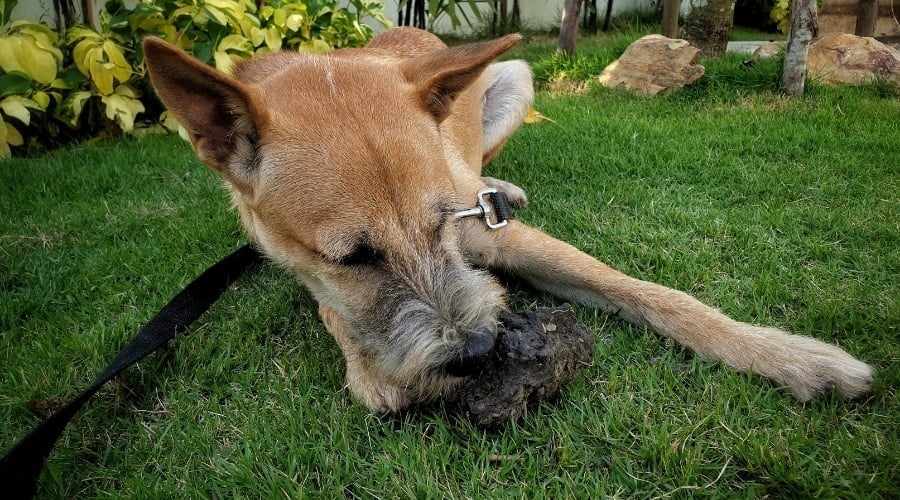
1. Natural Instinct: It’s In Their DNA
Before dogs became our couch-loving companions, they were wild animals hunting for food. Wolves, coyotes, and other wild canines are known to eat grass occasionally, which suggests this behavior is deeply ingrained.
Grass may have helped their ancestors digest food, cleanse their system, or even supplement their diet with fiber. So, if your dog nibbles on grass here and there, it could simply be an instinct that has stuck around for thousands of years.
2. Do Dogs Eat Grass To Make Themselves Vomit?
This is one of the most common beliefs, but it’s not entirely accurate. While some dogs may eat grass with an upset stomach, remember, research shows that less than 25% of dogs vomit after eating grass.
That means most dogs aren’t chowing down on the lawn because they feel sick. Instead, they may just like the texture, or they might be following a different instinctual urge. However, if your dog eats grass frantically and vomits often, it could indicate an underlying digestive issue that needs attention.
3. Can Grass Help Digestion?
For some dogs, eating grass may be their way of adding fiber to their diet. Dogs don’t always get enough roughage from processed kibble, so they might turn to grass as a natural alternative. Fiber helps keep digestion moving smoothly. So, if your dog’s diet lacks it, they might instinctively seek out grass to compensate.
If you suspect this might be the case, consider switching to a high-fiber dog diet. You could also try incorporating more fiber-rich foods into their meals, such as dog-safe fruits and veggies.
4. Boredom
Dogs sometimes eat grass simply because they have nothing better to do. If your pup is left outside with little mental stimulation, they might start chewing on grass just to pass the time. Activities that help stave off boredom include increased socialization, physical exercise, and mental stimulation. Some boredom-busting activities include more frequent walks, dog park visits, doggy daycare, dog training, and dog sports.
5. Stress Or Attention-Seeking
Similarly, stress or anxiety can lead to compulsive behaviors, including grass-eating. If your dog tends to graze when left alone or in unfamiliar environments, they could use it as a coping mechanism.
There are numerous methods of tackling stress in dogs, depending on the source of the anxiety. Common treatments include desensitization therapy, increased exercise levels, vet-approved herbal remedies, increased companionship levels, nontraditional therapies, or prescription medication. It is important to consult a licensed veterinarian to find the right solution for any dog experiencing anxiety to find a treatment that would work most effectively for an individual dog.
And let’s not forget about attention-seeking. If your dog notices that eating grass makes you react, they might keep doing it just to get your attention. In that case, try redirecting their focus with a chew toy, a training session, or some interactive play.
6. Does Your Dog Have A Nutritional Deficiency?
Some experts believe dogs may eat grass if they lack specific nutrients, vitamins, or minerals. While there isn’t strong scientific evidence to support this theory, a poor diet could contribute to unusual eating habits.
If your dog is on a low-quality or highly processed diet, their body might be searching for missing nutrients in other ways, including grazing on grass. To rule this out, make sure your pup is getting a well-balanced, high-quality diet that meets their nutritional needs.
7. Maybe They Just Like The Taste!
Believe it or not, some dogs eat grass simply because they enjoy it. The texture, the smell, or even the taste of fresh grass can be appealing to some pups. As some dogs rub themselves in feces to disguise their scent, some instinctively eat grass as an alternative food source, or they just like doing it.
If your dog casually munches on a few blades now and then but isn’t getting sick, there’s a good chance they just like the experience. An occasional snack probably isn’t a big deal as long as the grass is safe, untreated, and free of toxic plants. Watch this short video from Better Homes & Gardens summarizes why dogs tend to eat grass.
How To Determine The Reason Your Dog Eats Grass
One of the biggest challenges is identifying why it’s happening. The first step is a veterinarian visit to check for any potential abnormalities with a blood draw, fecal test, and urine analysis. Before the appointment, take note of your dog’s demeanor while grass-eating so that you can inform the vet of any unusual behavior that could help to identify the cause. For example, you may notice that your dog is nervous or seems ill before they eat grass.
In the next section, I’ll go over when you should be concerned, what medical conditions could be at play, and when to call your vet.
When Should You Worry? Signs It’s A Health Issue
Most of the time, dogs eat grass for harmless reasons, whether it’s instinct, boredom, or just because they like the taste. But what if it’s something more serious? If your dog constantly eats grass, vomits frequently, or shows other signs of discomfort, there might be an underlying health issue at play. Let’s go over the warning signs, possible medical causes, and when you should call your vet.
What If Your Dog Eats Grass and Doesn’t Vomit?
Many dog owners assume that grass-eating means their dog is sick, but here’s the twist: most dogs don’t throw up after eating grass. So, if your dog eats grass but acts completely normal afterward, chances are it’s just a habit or a way to add fiber to their diet. However, if your dog is eating grass frantically, swallowing large amounts, or seems distressed afterward, it could be a sign that something is off.
Medical Conditions That May Cause Grass Eating
While most grass-eating is harmless, some medical issues can trigger this behavior. Here are a few possibilities:
1. Gastrointestinal Issues (Upset Stomach, Acid Reflux, Or Indigestion)
If your dog is experiencing stomach discomfort, they might instinctively eat grass in an attempt to soothe their belly. Some dogs with acid reflux, bloating, or mild nausea may try eating grass to make themselves feel better.
Signs to watch for:
- Frequent vomiting (especially after eating)
- Excessive licking of lips or the air
- Gurgling noises in the stomach
- Lack of appetite
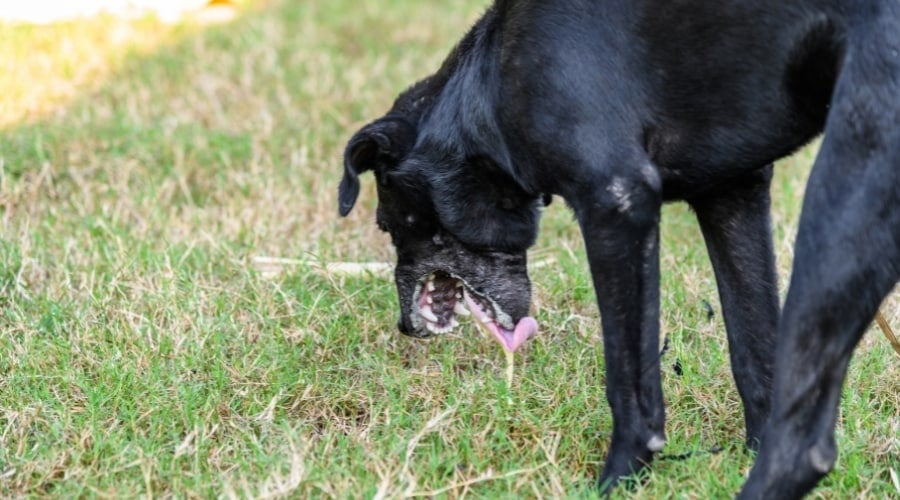
2. Parasites (Worms Or Other Infections)
Dogs that have intestinal parasites, such as roundworms or hookworms, may have an increased urge to eat non-food items, including grass. These parasites interfere with digestion and nutrient absorption, which might make your dog feel like they need to eat something extra.
Signs to watch for:
- Weight loss despite a normal appetite
- Scooting or dragging their rear on the ground
- Changes in stool (diarrhea, mucus, or visible worms)
3. Dietary Deficiencies (Not Enough Fiber Or Nutrients)
According to the American Kennel Club (AKC), dogs lacking fiber or certain nutrients might eat grass as a way to supplement their diet. While there’s no solid proof of this, it doesn’t hurt to evaluate your dog’s food to make sure they’re getting high-quality ingredients, fiber, and essential vitamins.
Signs to watch for:
- Eating non-food items (rocks, dirt, plastic, or poop)
- Chronic constipation
- Dull coat or flaky skin
In the case of a lack of fiber, a dog will not digest and excrete waste properly. This may lead to grass-eating to increase fiber intake, making stools easier to pass. Learn more about probiotics to help improve your dog’s digestion.
Pica As Evidence Of Dietary Imbalance
In humans, the condition known as pica is a compulsion to consume items that are not edible. Pica can drive people to eat rocks, dirt, Styrofoam material, and anything else they should not eat. The most common explanation for pica in humans is a mineral deficiency. This could be true for dogs that eat grass.
Do Certain Dog Breeds Eat Grass More?
While any dog can eat grass, some breeds seem to have a higher tendency to do it. erding breeds like Border Collies, Australian Shepherds, and Shelties tend to be more prone to obsessive behaviors, including grass-eating. Additionally, some smaller breeds with sensitive stomachs, like Yorkies and Maltese, may be more likely to eat grass if they experience frequent acid reflux or digestive issues.
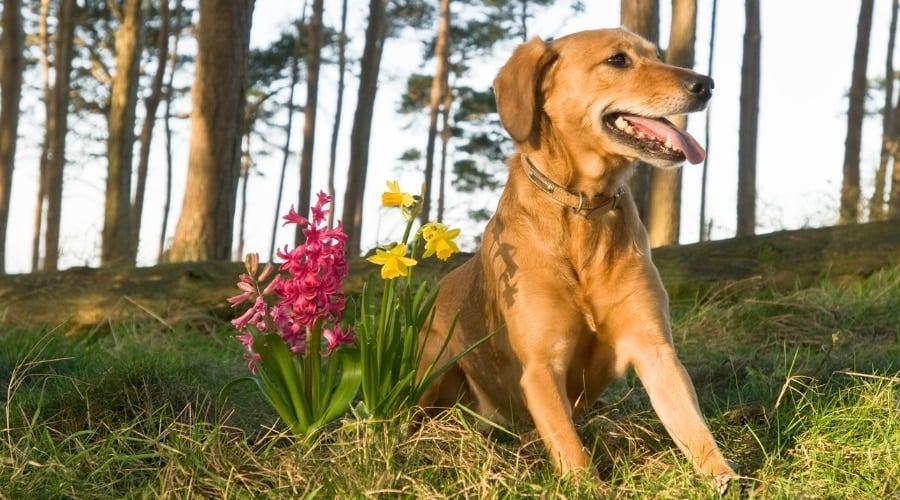
If your dog is eating grass constantly, especially if they’re a breed known for obsessive tendencies, it may be a good idea to provide more mental stimulation, training, or interactive toys to curb the habit.
What Types Of Grass Or Plants Are Harmful To Dogs?
Not all grass is safe for dogs to eat. Some lawns are treated with pesticides, herbicides, or fertilizers that can be toxic to pets. Even if the grass itself isn’t dangerous, certain plants mixed in can be deadly.
Dangerous substances to watch out for:
- Pesticides & Herbicides. Can cause vomiting, seizures, or poisoning.
- Fertilizers. Often contain harmful chemicals that can irritate the stomach.
- Toxic plants. Certain plants mixed in with grass, like oleander, azaleas, or mushrooms, can be deadly if ingested.
In most public locations, a warning sign of possible pesticides or chemicals must be displayed to alert owners to keep pets off the grass. Not only can dogs ingest these chemicals by eating grass, but they may also lick them off their paws after walking on contaminated ground. If your dog has eaten treated grass or unknown plants and is acting strangely, call your vet immediately. You can also reach the Pet Poison Helpline at (855) 764-7661.
When To Contact Your Veterinarian
Occasional grass-eating is normal, but if it becomes excessive, leads to vomiting, or comes with other concerning symptoms, a vet visit is a good idea. Call your vet if your dog:
- Eats grass obsessively and can’t seem to stop
- Throws up frequently after eating grass
- Shows signs of an upset stomach (restlessness, whining, bloating)
- Has diarrhea, constipation, or changes in appetite
- Eats chemically treated grass or unknown plants
- Eats other objects like dirt, rocks, thistles, or plastic
Your vet can help rule out medical causes, check for parasites, and offer dietary adjustments if needed.
How Pet Insurance Can Help
Having pet insurance is a smart way to protect your dog’s health and your wallet, especially if their grass-eating habit leads to unexpected vet visits. While most cases of grass-eating are harmless, it can sometimes signal underlying health issues like digestive problems, nutritional deficiencies, or even lead to poisoning from chemically treated grass. Vet bills can add up quickly if diagnostic tests, treatments, or emergency care are needed.
Reports show pesticides are among the leading causes of pet poisoning in veterinarians’ offices. With pet insurance, you can get reimbursed for many medical expenses, making it easier to provide the best care for your dog without worrying as much about the cost. Having insurance can give you peace of mind, knowing that your pup’s well-being can always come first. We have researched the best pet insurance to simplify finding the right option. You can also use our free pet insurance quote engine below.
In the next section, I cover training tips, diet changes, and easy ways to redirect this behavior.
How to Stop Your Dog From Eating Grass (If Necessary)
So, your dog has turned your lawn into an all-you-can-eat salad bar. Maybe you’re worried about them munching on chemically treated grass, or perhaps the habit is getting out of hand. Either way, you’re wondering: How can I stop my dog from eating grass?
The good news? You can train your dog to stop, but first, you need to understand why they’re doing it. Some dogs eat grass out of boredom, while others do it because they need more fiber or mental stimulation. The key is to redirect their behavior in a healthy way. Let’s dive into the best solutions.
1. Should You Stop Your Dog From Eating Grass?
Before you rush to stop the habit, ask yourself: Is it actually a problem? If your dog occasionally nibbles on pesticide-free, untreated grass and isn’t vomiting or showing signs of illness, you may not need to intervene at all. Some vets say grass-eating is normal and not necessarily harmful.
However, if your dog is:
- Obsessively eating grass every time they go outside
- Vomiting frequently after grazing
- Eating chemically treated grass or toxic plants
- Displaying signs of an upset stomach (licking lips, drooling, pacing)
It’s time to step in and stop the behavior.
2. Provide A More Nutritious Diet
One theory is that dogs eat grass when they’re missing fiber or essential nutrients in their diet. While there’s no scientific proof, it doesn’t hurt to evaluate what your dog is eating to ensure they’re getting a balanced diet.
Try adding fiber-rich, dog-safe foods to their meals, such as:
- Pumpkin (great for digestion)
- Green beans (low-calorie and full of fiber)
- Carrots (a crunchy, healthy snack)
- Apples (fiber-rich but in moderation)
If your dog is on a low-quality or highly processed diet, consider switching to a premium dog food with natural ingredients, whole proteins, and balanced fiber levels. We have a guide that focuses on the best dog food types and which might be the best option for your pup. You should also read our guide on foods not to feed dogs.
Remember, you should always change your dog’s food slowly. Dogs have sensitive digestive tracts, and a rapid alteration in their diet can cause gastric upset, leaving them very uncomfortable. Learn how to switch your dog’s food safely.
3. Keep Your Dog Mentally & Physically Engaged
Sometimes, grass-eating is a boredom problem. Dogs who don’t get enough exercise, playtime, or mental stimulation may start chewing on grass simply because it gives them something to do. Here are ways to keep your dog busy so they forget about grass:
- Increase daily walks or playtime to burn off energy
- Try interactive puzzle toys that engage their brain
- Train them with new tricks or commands for mental enrichment
- Set up playdates with other dogs to keep them social and engaged
A tired and mentally stimulated dog is less likely to snack on grass just for fun.
4. Train Your Dog To Stop Eating Grass
If your dog won’t stop eating grass, training is your best bet. Teaching a “leave it” or “drop it” command can help break the habit and prevent them from grabbing grass during walks or in the yard.
How to train “Leave It”:
- Hold a treat in your hand and let your dog sniff it.
- When they try to grab it, say “leave it” in a firm but calm tone.
- The moment they stop reaching for it, reward them with a different treat.
- Repeat until they respond to “leave it” without hesitation.
- Try using the command outside when they go for grass.
Food-oriented dogs will learn to stop their behavior quickly when given a treat reward (here are some recommended treats for training). Taking the dog out to use the bathroom or for a walk with treats in hand is the best way to train this dog. Whenever grass tempts your dog, use a treat to invite them back to the walking path instead. Rewarding good behavior will help reinforce the idea that grass is off-limits.
While most dogs do not experience adverse effects from grass-eating, this behavior can prove dangerous for those living in areas with frequent pesticide use. In these cases, you might want to consider training your dog to stop eating grass. Remember that consistency is key!
If your dog needs more help, we suggest you check out Doggy Dan’s online dog training school.
5. Offer Safe Alternatives For Dogs Who Love To Chew
If your dog just loves chewing on something green, why not offer a safe alternative? Some pet owners grow dog-safe grass or herbs indoors so their pups have something safer to munch on. Safe options include:
- Wheatgrass (often found in pet stores)
- Oat grass (gentle on digestion)
- Dog-friendly herbs like parsley or basil
This way, your dog gets their grass fix without the risk of pesticides, toxins, or stomach issues.
6. Supervise Outdoor Time & Remove Temptation
One of the easiest ways to stop grass-eating? Remove access to it. If you have a yard, consider:
- Creating a designated play area with no grass
- Keeping your dog on a leash during walks to control where they sniff
- Distracting them with toys or treats when they start heading for the grass
The less opportunity they have to graze, the easier it will be to break the habit.
Need To Decipher Other Quirky Dog Behaviors?
Dogs have plenty of quirky behaviors that leave us scratching our heads, and grass-eating is just one of them. Ever wondered why dogs sniff crotches the second they meet someone? It’s not bad manners, it’s science. Other odd but often normal behaviors include tail-chasing, eating poop, and barking at nothing. While some habits are just instinctual or playful, others could indicate boredom, anxiety, or medical issues. Understanding these behaviors helps us decipher what our dogs are really trying to tell us!
Does your dog regularly treat themself to an all-they-can-eat lawn buffet? Do you have any other tips on how to stop dogs from eating grass? Let us know in the comments below.
Why Trust Canine Journal
Sadie has more than two decades of dog care and ownership experience, specializing in the care and companionship of her beloved Cavalier King Charles Spaniels. Over the years, she’s spent hours of extensive training, collaborating with multiple certified trainers across various settings, from in-home sessions to virtual private lessons to training academies and online courses. She uses positive reinforcement training to build a strong bond with her dogs, emphasizing encouragement and rewards for good behavior. Sadie’s dog suffers from food allergies, and her dogs have had a number of pet illnesses and issues, including anal gland problems, kennel cough, poisoning, cancer, heart murmurs, dental extractions, and more. She works with a dedicated team to provide Canine Journal’s readers with the most accurate and up-to-date information to help them care for their pups.
